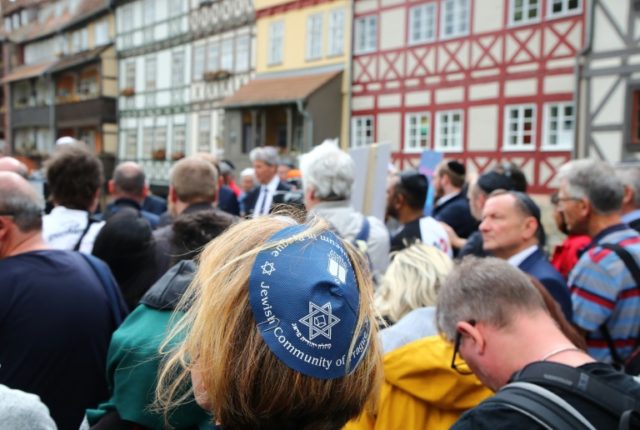Berlin (AFP) – Organisers of a major German music prize scrapped their main award Wednesday due to an anti-Semitism row, as Germans staged shows of solidarity with Jews after a spate of shocking hate crimes.
A cascade of recent scandals, including the “Echo” prize-winning rap duo making light of Nazi death camp prisoners, has raised pointed questions about Germany’s ability to protect its burgeoning Jewish community seven decades after the Holocaust.
On Tuesday, the head of the country’s Central Council of Jews, Josef Schuster, set off shockwaves with a warning against wearing religious symbols in public for fear of attack.
“We must never allow anti-Semitism to become commonplace in Germany again,” Foreign Minister Heiko Maas told the daily Tagesspiegel ahead of a “Berlin Wears Kippa” event where Jews and non-Jews will wear the traditional skullcap in a shared show of defiance.
Demonstrations in support of Jews were also planned in the cities of Cologne, Potsdam and Magdeburg.
Earlier in the day in the eastern city of Erfurt, about 150 people, including Christian and Muslim community representatives and political officials, marched wearing kippas from the city’s medieval Jewish baths to the main local synagogue.
Newspapers offered paper cutouts of skullcaps for readers to wear.
The rallies came a week after a 19-year-old Syrian refugee attacked two young men wearing kippas in a trendy district of the capital, shouting “yahudi” — Jew in Arabic — and lashing out at his victim with a belt.
A video of the assault, filmed by one of the Israeli victims, went viral on social media and sparked widespread revulsion.
The issue of anti-Semitism is particularly fraught in Germany, which has gone to great lengths to atone for its Nazi past and whose political class takes deep pride in the growth of the now 200,000-strong Jewish community.
However, a number of high-profile incidents in recent months have stoked fears of a possible resurgence of anti-Semitism from both the far-right and a large influx of predominantly Muslim asylum-seekers since 2015.
– Attack on ‘remembrance culture’ –
In March, the Central Council of Jews urged schools to keep track of religious bullying following reports that a young Jewish girl was allegedly harassed and threatened by Muslim fellow pupils at a Berlin primary school.
Earlier this month, two rappers raised hackles by winning the Echo music prize after selling more than 200,000 copies of their album which features a lyric boasting that their bodies are “more defined than Auschwitz prisoners”.
Amid the anguished national debate on the issue, organisers of the Echo prize said they would axe the award because they did not want it to be “seen as a platform for anti-Semitism, misogyny, homophobia or the playing down of violence”.
Minutes later the rappers’ music label, BMG, announced that it was dropping the duo, Farid Bang and Kollegah.
The far-right Alternative for Germany party, which captured nearly 13 percent of the vote in September’s general election, has also not shied away from questioning Germany’s cherished “remembrance culture”.
Party member Bjoern Hoecke last year called Berlin’s Holocaust memorial a “monument of shame” and said Germany should take a “180-degree” turn away from its guilt over World War II crimes.
– ‘Hide their identities’ –
Chancellor Angela Merkel on Sunday denounced the emergence of “another form of anti-Semitism”, beyond that of right-wing extremist groups, from Muslim refugees, in an interview with Israeli television.
She reaffirmed that the security of Jews and of the state of Israel was a central concern for Germany because of its “eternal responsibility” for the Holocaust in which the Nazis murdered six million European Jews.
However, Schuster of the Central Council appeared to question that assurance Tuesday with a stark warning that Jews who wear the kippa or the Star of David could be courting danger on German streets.
The remarks sparked outrage, with the Nazi-hunting Simon Wiesenthal Center accusing authorities of disappointing Jews’ faith in German democracy.
“When the respected head of German Jewry feels it necessary to urge Jews to hide their identities in public, it is clear that German authorities have failed to protect the rights of their Jewish citizens and are failing to counter growing anti-Semitism,” Rabbi Abraham Cooper of the Los Angeles-based association said.

COMMENTS
Please let us know if you're having issues with commenting.